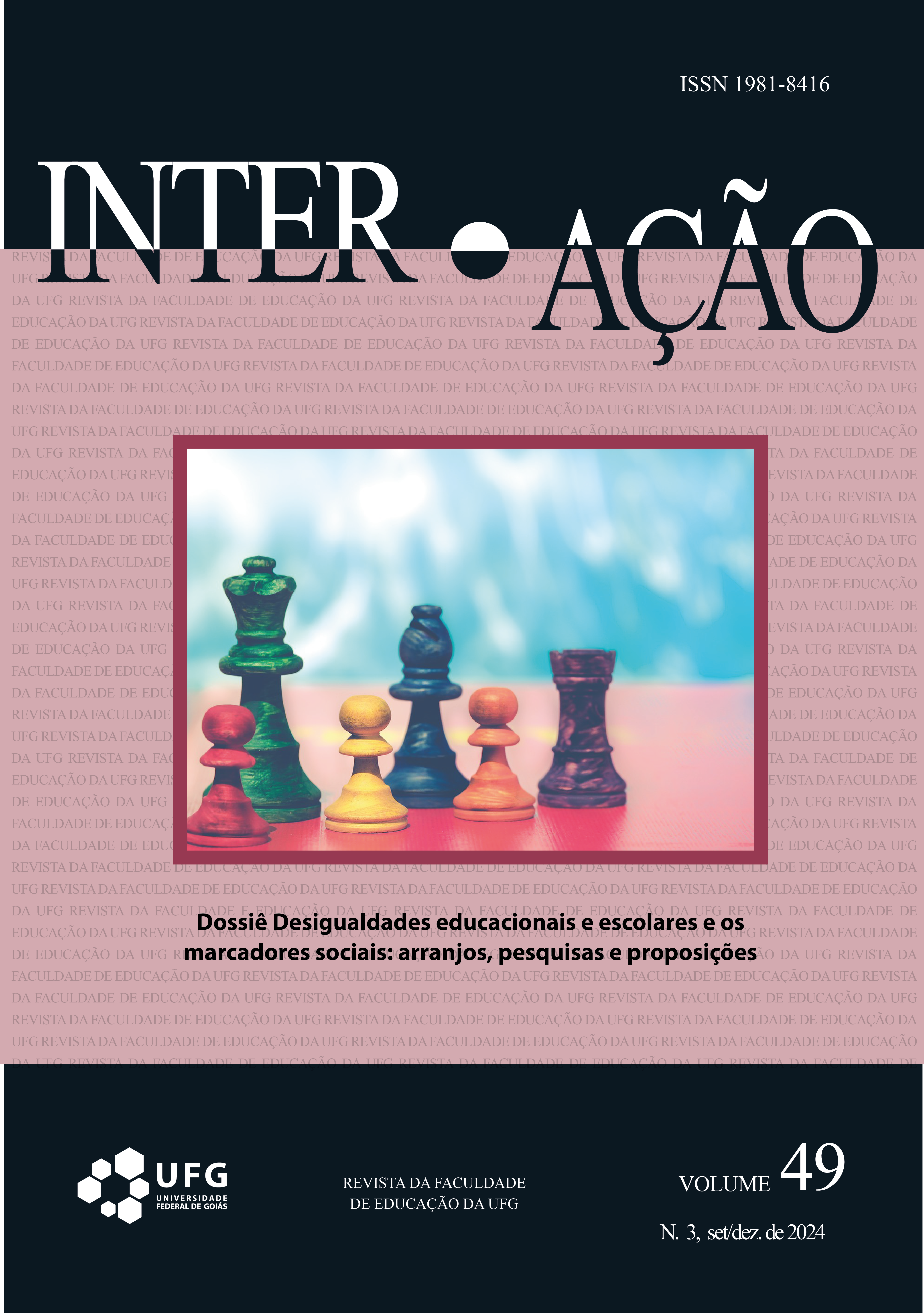“NEM TUDO SÃO FLORES”: OS DESAFIOS NO ACESSO E PERMANÊNCIA À EDUCAÇÃO BÁSICA E SUPERIOR DE PESSOAS TRANSEXUAIS E TRAVESTIS EM PERNAMBUCO
DOI :
https://doi.org/10.5216/ia.v49i3.79466Mots-clés :
Educação. Direitos Humanos. Transexuais. Travestis.Résumé
O ensino superior tem um papel fundamental na formação cidadã e no processo de humanização das pessoas, possibilitando a formação de uma sociedade democrática e plural que se orienta pelo respeito à dignidade humana. Diante do exposto, esse artigo busca analisar as barreiras que impedem a trajetória acadêmica de pessoas transexuais e travestis na educação básica e no ensino superior. O estudo utilizou como metodologia a pesquisa qualitativa, a partir do procedimento de coleta de dados com um questionário composto por 20 questões abertas, com a participação de quatro colaboradoras, dentre elas, pessoas transexuais e travestis que contribuíram com os dados da pesquisa. O tratamento analítico dos dados ocorreu mediante estatística descritiva simples e pela Análise de Conteúdo (Bardin, 2011). Destarte, essa pesquisa aponta para as possíveis consequências de violências sofridas por transexuais e travestis no ambiente universitário, a partir de uma reflexão sobre o enfrentamento a essas barreiras e garantir acessibilidade e mecanismos de permanência para pessoas trans e travestis no ensino superior.
Téléchargements
Références
BARDIN, Laurence. Análisis de contenido. Ediciones Akal, 1991.
BAYDOUN, Mahmoud. Pensando as masculinidades contemporâneas. Revista Artemis. v. 31, n. 1, pág. 486-491, 2021.
BENEVIDES, Maria Victoria.Educação em Direitos Humanos: de que se trata? Disponível em: http://portal.mec.gov.br/seb/arquivos/pdf/Etica/9_benevides.pdf Acesso em: 10 abr. de 2024.
BOBBIO, Norberto. A era dos direitos. Rio de Janeiro: Campus, 2004.
BRASIL. Constituição da República Federativa do Brasil de 1988. Disponível em: Acesso em: 3 ago. 2012. BRASIL. Lei nº 8.069, de 13 de julho de 1990. Dispõe sobre o Estatuto da Criança e do Adolescente e dá outras providências. Disponível em: Acesso em: 2 ago. 2012. BRASIL. Lei de Diretrizes e Bases da Educação Nacional - LDB: Lei nº 9394/96, que estabelece as diretrizes e bases da educação nacional. 2. ed. Brasília: Câmara dos Deputados, Coordenação de Publicações, 2001.
BRASIL. Lei nº 8.069, de 13 de julho de 1990. Dispõe sobre o Estatuto da Criança e do Adolescente e dá outras providências. Disponível em. Acesso em: 15 jun. 2023.
BRASIL. Lei de Diretrizes e Bases da Educação Nacional – LDB: Lei nº 9394/96, que estabelece as diretrizes e bases da educação nacional. 2. ed. Brasília: Câmara dos Deputados, Coordenação de Publicações, 2001.
BRASIL. Comitê Nacional de Educação em Direitos Humanos. Plano Nacional de Educação em Direitos Humanos. Brasília: Secretaria Especial dos Direitos Humanos, Ministério da Educação, 2003.
CELLARD, André. A análise documental. 4. ed. Petrópolis, RJ: Vozes, 2014.
CHAUÍ, Marilena. Direitos humanos e educação. Revista Interdisciplinar de Direitos Humanos, v. 10, n. 2, p. 23-26, 2022.
CRESWELL, John W. Projeto de pesquisa: métodos qualitativo, quantitativo e misto; trad. Magda Lopes. 3. ed. Porto Alegre: ARTMED, 2010.
DALLARI, D. A. Direitos Humanos e Cidadania. São Paulo: Moderna, 2014. FREIRE, Paulo. Prefácio. In: RIBEIRO, Marcos. Educação Sexual: novas ideias, novas conquistas. São Paulo: Editora Gente, 1993.
GARCIA, Clarice. Aparecida Alencar. SOUZA, Fabiana. Cristina de. A relação família-escola através dos tempos. Temas em Educação e Saúde, Araraquara, v. 4, p. 59- 74, mai. 2017. Tradução de Plínio Dentzien. Campinas, Núcleo de Estudos de Gênero Pagu, 2007.
LIBÂNEO, José Carlos. Pedagogia e pedagogos, para quê? São Paulo: Cortez, 2022.
LOURO, Guacira Lopes. Gênero, sexualidade e educação. Uma perspectiva pós-estruturalista. Petrópolis, RJ: Vozes, 1997.
MISKOLCI. Richard. Teoria Queer: um aprendizado pelas diferenças. Belo Horizonte: Autêntica, 2012.
SCHMITZ, Beto. Observatório 2023 de Mortes Violentas de LGBT+ no Brasil, Grupo Gay da Bahia. Grupo Dignidade. Disponível em: https://cedoc.grupodignidade.org.br/2024/01/19/2023-de-mortes-violentas-lgbt-no-brasil-ggb/ Acesso em 10 abr. de 2024.
PIOVESAN, Flávia. Direitos humanos e o direito constitucional internacional. 10. Ed. São Paulo: Saraiva, 2009.
PRECIADO, Paul Beatriz. Quem defende a criança queer? Trad. C. Oliveira. Geni, pp. 1-9, 2002. Disponível em http://revista eni.org/10/quem-defende-a-criança-queer. Acesso em 10 abr. 24.
RESENDE, Tânia de Freitas; SILVA, Gisele Ferreira da. A relação família-escola na legislação educacional brasileira (1988-2014). Ensaio: avaliação e políticas públicas em Educação, Rio de Janeiro, v. 24, n. 90, p. 30-58, jan./mar. 2016.
RIBEIRO, Jheniffer; NASCIMENTO, Vivian. Apenas cinco universidades públicas destinam vagas para pessoas trans. (2023). Disponível em: https://www.generonumero.media/artigos/universidades-publicas-cotas-trans-travestis/ Acesso em: 10 abr. de 24.
SAVIANI, Dermeval. Da LDB (1996) ao novo PNE (2014-2024): por uma outra política educacional. Autores Associados, 2019.
SEDGWICK, Eve Kosofsky. A epistemologia do armário. Cadernos Pagu, quereres, v.28, p. 19-54, 2007. Disponível em: <https://ieg.ufsc.br/storage/articles/October2020//Pagu/2007(28)/Sedgwick.pdf>. Acesso em 10 abr. 24.
Téléchargements
Publié-e
Comment citer
Numéro
Rubrique
Licence
© Adriano de Freitas Alves, Aline Daiane Nunes Mascarenhas, Jônatan David Santos Pereira 2024

Cette œuvre est sous licence Creative Commons Attribution - Pas d'Utilisation Commerciale 4.0 International.
A Inter-Ação utiliza como base para transferência de direitos a licença Creative Commons Attribution 4.0 para periódicos de acesso aberto (Open Archives Iniciative - OAI). Por acesso aberto entende-se a disponibilização gratuita na Internet, para que os usuários possam ler, baixar, copiar, distribuir, imprimir, pesquisar ou referenciar o texto integral dos documentos, processá-los para indexação, utilizá-los como dados de entrada de programas para softwares, ou usá-los para qualquer outro propósito legal, sem barreira financeira, legal ou técnica.
Autores que publicam neste periódico concordam com os seguintes termos:
1) Autores mantém os direitos autorais e concedem à revista o direito de primeira publicação, com o trabalho simultaneamente licenciado sob a Licença Creative Commons Attribution que permite o compartilhamento do trabalho com reconhecimento da autoria e publicação inicial nesta revista.
2) Autores têm autorização para assumir contratos adicionais separadamente, para distribuição não-exclusiva da versão do trabalho publicada nesta revista (ex.: publicar em repositório institucional ou como capítulo de livro), com reconhecimento de autoria e publicação inicial nesta revista.
3) Autores têm permissão e são estimulados a publicar e distribuir seu trabalho online (ex.: em repositórios institucionais ou na sua página pessoal) a qualquer ponto antes ou durante o processo editorial, já que isso pode gerar alterações produtivas, bem como aumentar o impacto e a citação do trabalho publicado.















